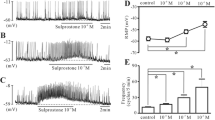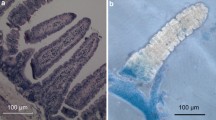Abstract
The effects of a number of agonists which inhibit intestinal chloride secretion were investigated in Colony-1 (Col-1) cells, a subpopulation derived from the HCA-7 human adenocarcinoma cell line. Neither peptide YY (PYY) or somatostatin 14–28 (SRIF) reduced short-circuit current (SCC) in Col-1 epithelial layers stimulated with vasoactive intestinal polypeptide (VIP), suggesting that their respective receptors are either absent in this cell line, or are not functionally coupled. A second member of the neuropeptide Y family, pancreatic polypeptide (PP), decreased VIP-elevated SCC with an EC50 of 25.6 nM. Maximal PP responses were unaffected by prior addition of PYY, indicating that Col-1 cells may express a PP specific, Y4-like receptor. The α2-adrenoceptor agonist clonidine also attenuated VIP-stimulated SCC (EC50 342 nM) through the α2A receptor subtype, since clonidine responses were inhibited by yohimbine and rauwolscine but not altered by previous addition of prazosin. Col-1 cells responded to both apical and basolateral addition of VIP or clonidine; to an extent, this lack of sidedness reflects the ability of drugs to permeate through the Col-1 epithelial layers.
Both PP and clonidine also inhibited SCC in unstimulated Col-1 cells or those pretreated with 3-isobutyl-1-methylxanthine (IBMX) or a submaximal concentration of forskolin, agents which both directly elevate intracellular cAMP. After a maximal concentration of forskolin (10 μM), which increased SCC to a significantly greater extent than either VIP or IBMX, the effects of both agonists were negligible. The absence of PP and clonidine responses under these conditions may have implications for the mechanisms by which these agonists inhibit chloride secretion in Col-1 epithelia. In addition carbachol reduced SCC stimulated by 10 μM forskolin, in contrast to control carbachol responses which consisted of a rapid decrease followed by a transient elevation in SCC; this observation suggests that Col-1 cells may also be a useful model for studying the interactions between Ca2+- and cAMP-dependent mechanisms involved in epithelial ion transport.
Similar content being viewed by others
Author information
Authors and Affiliations
Additional information
Received: 17 June 1996 / Accepted: 11 October 1996
Rights and permissions
About this article
Cite this article
Holliday, N., Tough, I. & Cox, H. Inhibition of cyclic AMP-dependent chloride secretion by PP receptors and α2-adrenoceptors in a human colonic epithelial cell line. Naunyn-Schmiedeberg's Arch Pharmacol 355, 183–189 (1997). https://doi.org/10.1007/PL00004930
Issue Date:
DOI: https://doi.org/10.1007/PL00004930




